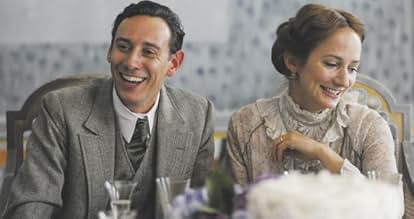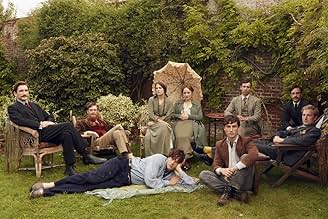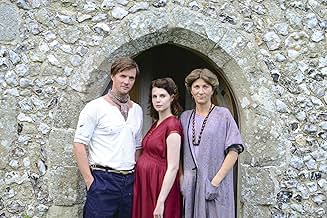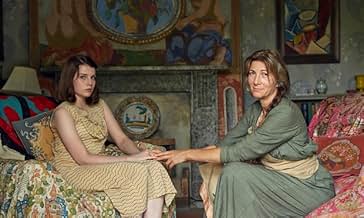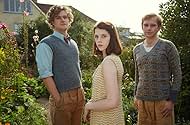Un drama íntimo y emotivo para BBC Two sobre el revolucionario grupo de Bloomsbury.Un drama íntimo y emotivo para BBC Two sobre el revolucionario grupo de Bloomsbury.Un drama íntimo y emotivo para BBC Two sobre el revolucionario grupo de Bloomsbury.
Explorar episodios
Opiniones destacadas
This series comes across as bits and pieces of lives of the Bloomsbury Group that has been loosely strung together on a very hurried timeline. There is little in the way of character development or much continuity. Seems to just be a collection of snippets and vignettes. The actors do what they can with the weak script and superficial dialog but it just fails to ring true in any way.
Although I did not expect it, I found LIFE IN SQUARES to be a remarkable piece of television drama, offering insights into the lives of the Bloomsbury Group that I had never previously thought of.
The title is a clever one, suggesting the bourgeois existence of the Stephen sisters Virginia and Vanessa (played by Lydia Leonard, Eve Best, Phoebe Fox, and Catherine McCormack across the three-episode structure) where they grew up in luxury, but also denoting imprisonment, both mental and emotional. David Roger's production designs, with elegant rooms heavily over-stuffed with curios of all historical periods, restrict the actors' freedom of movement; they are forced to move round chairs, or negotiate too many ornaments. When the Bloomsbury Group meet for their regular soirées, they do so in small, confined rooms, with little room to breathe.
This kind of goldfish-bowl lifestyle inevitably has a significant effect on the Group's life-choices. While dedicating themselves to ideals of artistic purity that transcend the mundane concerns of early twentieth century Britain, we wonder whether that represents nothing more than a form of futile release from conformity. This is especially summed up in Vanessa Bell's checkered career; a talented artist in her own right, she becomes so much subject to her husband Clive's (Sam Hoare/ Andrew Havill's) bidding that she ends up losing her artistic will. She embarks on a long-term relationship with Duncan Grant (James Norton/ Rupert Penry-Jones), but finds little emotional satisfaction there - despite his undying devotion to her, he remains a professed homosexual.
Virginia experiences equal pains. We know from the start that she is mentally fragile, but it seems that her sister's overbearing nature, coupled with the prevailing ideology that all wives should have children at that time, pushes her into marriage with Leonard Woolf (Al Weaver. Guy Henry), Although the two enjoy a tranquil and often fulfilling life, it is not what Virginia wants. She tries to find solace in her writing, but even that is not enough to prevent her from committing suicide at the outbreak of World War II. From this drama, we get the sense of terrible sorrow that such an innovator should have felt so hemmed in by social and mental pressures that she should take her own life.
The sisters' existence does not change, even when they sacrifice London for the country, and Vanessa's family moves into Charleston, an idealized retreat still open to general visitors. Life there becomes even more claustrophobic, especially when Duncan's boyfriend David Garnett (aka Bunny) (Ben Lloyd-Hughes/ Jack Davenport) moves in. Vanessa is often forced into the role of unwilling peacemaker; at length she ends up doing something that she felt she must do, but ends up causing her lasting mental pain and suffering.
What makes LIFE IN SQUARES such a game-changing piece is that its sympathy extends to male and female characters alike. Would-be critics like Roger Fry (Elliott Cowan) are trying to make their way in the world as they pronounce on the effect of Modernism on the post-1918 universe, but they appear to lack the conviction to do so. This is chiefly due to their environment; the hothouse world of London (and provincial) society is so insulated from from worldly affairs that it ends up feeding on itself.
Brilliantly directed by Simon Kaijser from a script by Amanda Coe, LIFE IN SQUARES offers important material for reflection on the power as well as the limitations of the imagination, and how we must remain mindful of ourselves and our well-being rather than subjecting ourselves to the often restrictive dictates of prevailing socio-economic convention.
The title is a clever one, suggesting the bourgeois existence of the Stephen sisters Virginia and Vanessa (played by Lydia Leonard, Eve Best, Phoebe Fox, and Catherine McCormack across the three-episode structure) where they grew up in luxury, but also denoting imprisonment, both mental and emotional. David Roger's production designs, with elegant rooms heavily over-stuffed with curios of all historical periods, restrict the actors' freedom of movement; they are forced to move round chairs, or negotiate too many ornaments. When the Bloomsbury Group meet for their regular soirées, they do so in small, confined rooms, with little room to breathe.
This kind of goldfish-bowl lifestyle inevitably has a significant effect on the Group's life-choices. While dedicating themselves to ideals of artistic purity that transcend the mundane concerns of early twentieth century Britain, we wonder whether that represents nothing more than a form of futile release from conformity. This is especially summed up in Vanessa Bell's checkered career; a talented artist in her own right, she becomes so much subject to her husband Clive's (Sam Hoare/ Andrew Havill's) bidding that she ends up losing her artistic will. She embarks on a long-term relationship with Duncan Grant (James Norton/ Rupert Penry-Jones), but finds little emotional satisfaction there - despite his undying devotion to her, he remains a professed homosexual.
Virginia experiences equal pains. We know from the start that she is mentally fragile, but it seems that her sister's overbearing nature, coupled with the prevailing ideology that all wives should have children at that time, pushes her into marriage with Leonard Woolf (Al Weaver. Guy Henry), Although the two enjoy a tranquil and often fulfilling life, it is not what Virginia wants. She tries to find solace in her writing, but even that is not enough to prevent her from committing suicide at the outbreak of World War II. From this drama, we get the sense of terrible sorrow that such an innovator should have felt so hemmed in by social and mental pressures that she should take her own life.
The sisters' existence does not change, even when they sacrifice London for the country, and Vanessa's family moves into Charleston, an idealized retreat still open to general visitors. Life there becomes even more claustrophobic, especially when Duncan's boyfriend David Garnett (aka Bunny) (Ben Lloyd-Hughes/ Jack Davenport) moves in. Vanessa is often forced into the role of unwilling peacemaker; at length she ends up doing something that she felt she must do, but ends up causing her lasting mental pain and suffering.
What makes LIFE IN SQUARES such a game-changing piece is that its sympathy extends to male and female characters alike. Would-be critics like Roger Fry (Elliott Cowan) are trying to make their way in the world as they pronounce on the effect of Modernism on the post-1918 universe, but they appear to lack the conviction to do so. This is chiefly due to their environment; the hothouse world of London (and provincial) society is so insulated from from worldly affairs that it ends up feeding on itself.
Brilliantly directed by Simon Kaijser from a script by Amanda Coe, LIFE IN SQUARES offers important material for reflection on the power as well as the limitations of the imagination, and how we must remain mindful of ourselves and our well-being rather than subjecting ourselves to the often restrictive dictates of prevailing socio-economic convention.
I recorded this mini series because being a fan of Woolf's writing and being interested in Keynes I was interested in the topic. I delayed watching it because of the potential for lascivious sexism and cliché I have observed in other artistic works regarding the Bloomsbury set.
I started watching it when I was ill and was gripped. I like the way the author focused on Vanessa Bell and the avoidance of sexist representations of the women, as is so often the case, especially where there is a break from accepted relationship convention.
I was so glad the author just introduced some characters by name and didn't over explain who everyone was and list their achievements. Unlike a previous reviewer I was glad the snobbishness and self importance and flaws of individuals was not written out.
I particularly enjoyed the inclusion of angelica's experience. This took the examination of the group far beyond previous works I have encountered, giving the story some real emotional meaning.
Over all this series seemed to me to be an exploration of relationships. It reminded me of Phillip Larkin's poem of parenthood.
I started watching it when I was ill and was gripped. I like the way the author focused on Vanessa Bell and the avoidance of sexist representations of the women, as is so often the case, especially where there is a break from accepted relationship convention.
I was so glad the author just introduced some characters by name and didn't over explain who everyone was and list their achievements. Unlike a previous reviewer I was glad the snobbishness and self importance and flaws of individuals was not written out.
I particularly enjoyed the inclusion of angelica's experience. This took the examination of the group far beyond previous works I have encountered, giving the story some real emotional meaning.
Over all this series seemed to me to be an exploration of relationships. It reminded me of Phillip Larkin's poem of parenthood.
Given that this short series involves quite a few flashbacks and a relatively large cast of characters, the choice to have different actors play the "younger" and "older" versions of some of them really doesn't help, I think. Not only does this make it hard sometimes to work out who they are, but it leads to harsh comparisons of the performance (and in some cases the looks) of a few of them. Apart from the children, this would have been better done with make-up, I feel. In particular, Phoebe Fox is so great as Vanessa Bell that she is sorely missed in episode three. No offence to Eve Best, but she comes across as a completely different person - not only does she look nothing like Fox, but Vanessa feels "gone".
Having said that, it was nice not to have painful and protracted exposition of who all these people were, as collectively there would have been too much to fit in - and the series would have felt even more episodic than it sometimes does. As it is, the classic period drama cliches of "terrible things happening far away" are present and correct, as are their very real tragic effects, but the underlying aura of very privileged people playing around lingers.
Worth a look - although really only a 6 out of 10, IMHO. I gave it the 7th for Phoebe.
Having said that, it was nice not to have painful and protracted exposition of who all these people were, as collectively there would have been too much to fit in - and the series would have felt even more episodic than it sometimes does. As it is, the classic period drama cliches of "terrible things happening far away" are present and correct, as are their very real tragic effects, but the underlying aura of very privileged people playing around lingers.
Worth a look - although really only a 6 out of 10, IMHO. I gave it the 7th for Phoebe.
It's part two of Life in Squares tonight about the Bloomsbury Group and Virginia Woolf on BBC2 tonight at 21.00. In the first episode we romped through nearly ten years and saw how the embryonic group grew out of some Cambridge male graduates in the modern Bohemian squares of Bloomsbury. They were young free and single and OK. for money and everything was exciting. We saw how the complex relationships of Vanessa (nee Stephen) Bell, Virginia (nee Stephen) Woolf and the death of Thoby Stephen who brought the group together for their Thursday evening meetings. Painter Vanessa Stephen and her writer sister Virginia embarked on a life of unexpected and emerged from the whaleboned strictures of Victoria England. It was a remarkably accurate portrayal and covered a lot of ground in a short hour long program. I loved the lighting and treatment of some difficult subjects which set up tonight's second episode for an exciting continuation.
¿Sabías que…?
- TriviaAl Weaver and James Norton also star together on Masterpiece Grandchester.
Selecciones populares
Inicia sesión para calificar y agrega a la lista de videos para obtener recomendaciones personalizadas
- How many seasons does Life in Squares have?Con tecnología de Alexa
Detalles
- Fecha de lanzamiento
- País de origen
- Idioma
- También se conoce como
- Жизнь в квадратах
- Locaciones de filmación
- Productoras
- Ver más créditos de la compañía en IMDbPro
- Color
- Relación de aspecto
- 1.78 : 1
Contribuir a esta página
Sugiere una edición o agrega el contenido que falta

Principales brechas de datos
By what name was Life in Squares (2015) officially released in India in English?
Responda

